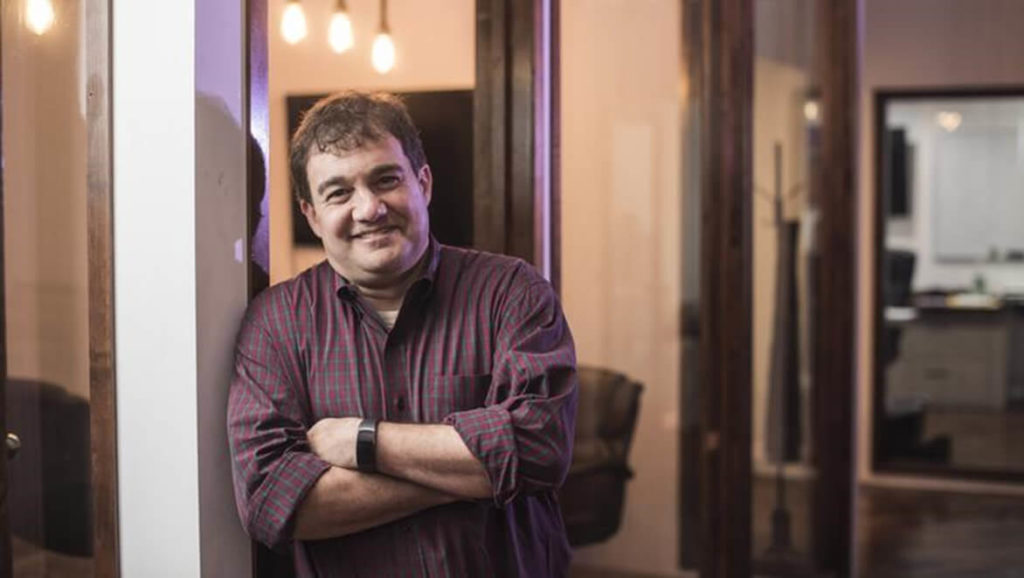Contributor Note: Aftercare Director Johnny Rosen, has been with Cumberland Heights since 1996. Along with serving the Alumni of Cumberland Heights, Johnny also supports technical needs, from recording the Sunday services to assisting in all sound, lighting and video projects on campus and for Cumberland Heights events. His son, J.J. Rosen, followed in his tech-savvy footsteps and founded the computer consulting business Atiba, where Johnny helps out on a part-time basis.
By: Joel Stinnett – Reporter, Nashville Business Journal

Aftercare Director Johnny Rosen, has been an active part of Cumberland Heights since 1996. His son, J.J. Rosen, followed in his tech-savvy footsteps and founded the computer consulting business Atiba, where Johnny helps out on a part-time basis.
Some people find their passion at a young age; for others it takes some time to find their path. For Atiba founder and Chairman J.J. Rosen, the latter was true. Rosen graduated from Vanderbilt University in 1992 and took a job with the district attorney general in Nashville. As the child support coordinator tasked with collecting more revenue, he noticed none of the offices around the state had computer systems. Rosen began to study how to code and eventually wrote software to help collect child support. Later, a consulting firm hired by the state leaned heavily on Rosen to install updates to his software. In response, Rosen started computer consulting business Atiba. Twenty-five years later, Rosen is still living his passion.
Your father was an entrepreneur — what did you learn from him?
My dad was in the music business. So, I sort of always had in my mind that I would work for myself at some point. In the ’70s my dad built a recording studio in the back of an 18-wheeler truck. It was used for recording live concerts and radio shows. So, I was a roadie in the summers for my dad. That was good for me because it taught me work ethic. It’s really not very much fun, it’s hard physical labor, and at the time I did not like it. But in hindsight it was probably a healthy thing to do. Also, my grandparents opened the first store in The Mall at Green Hills. … My grandmother on the other side was one of the first interior designers in Nashville. So, I had it in my mind from a young age I would do my own thing at some point. I just wasn’t quite sure what.
When you were growing up, you didn’t have an idea of what you wanted to do when you got older?
No; I wish I did. One of my best friends since we were little kids is a successful oncologist. I was jealous of him because he always knew he wanted to be a doctor. … I didn’t really have a passion until I got out of college.
What advice would you give recent college graduates who have yet to find their passion?
I would try to view your first job as a learning investment. Don’t worry about the salary. Try to find something where the main value is helping you learn what you like, and learn a skill. … When I got out of college with a general psychology degree, I couldn’t walk into a place and be like, “Hey, I have this degree, now I’m valuable.” I really had nothing to offer. No matter if you are into tech, a photographer, a musician or whatever it is, I think having some sort of trade is valuable.
How has Nashville’s tech scene changed since you started Atiba?
It was a really small community in the old days. There wasn’t, I don’t think, the opportunity there is now. Nashville’s growth has created more startup activity and been a catalyst for more tech activity. … Back when we were getting going there were only a few large companies that could support the tech community. Now, we are a hot spot, not just for health care or music, but for everything.
How can Nashville attract or create more tech talent?
We are definitely attracting more people to live here, but we can cultivate more homegrown talent by starting with middle schools and high schools. If you get out of high school and you can code, you can go ahead and get a job making an OK living right away. There are not many jobs like that.
What piece of outdated technology do you miss the most?
One is the phonograph, [one of] which I bought. I like the old-school sound of records playing. … The other one, and this is going way back — my dad had a briefcase phone. This is before the cell phone, and you had to call into a tower. The reason I miss that is the coolness factor, and at the time it was unique.
What is your favorite city to visit?
New Orleans …As the world has become smaller and more connected, it feels like some places are the same no matter where you go. But there are a few cities that are completely different and have a whole different vibe. Like New York, you go there and it’s like a different country. I find that same feeling with New Orleans.
You are a drummer; who is your favorite band?
The Meters …They are a musician’s band; musicians love them. They played this heavy New Orleans funk influenced by Mardi Gras and Indian beats.
Would you rather your two sons grow up to become musicians or software developers?
Ideally they could do both. Of course, I want them to do whatever is best for them and there is no pressure for them to go into the same field as me. If I had to choose, I would like them to pursue music so that they can make their own way.










